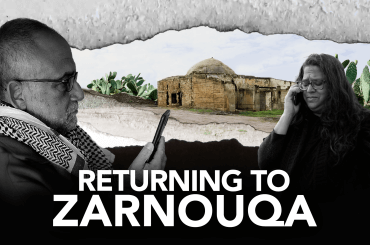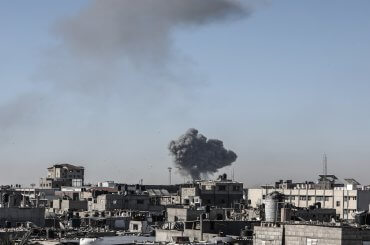HAIFA REPUBLIC
A Democratic Future for Israel
by Omri Boehm
200 pp. New York Review Books $14.95
In Israel today, liberal Jews see themselves as fighting for Israel’s democratic future, which is surely something of an eye-roller for Palestinians. Nonetheless, the battle that liberals are now waging pits them against the Palestinians’ most vicious enemies: those Israelis who are ready and eager to launch yet another ethnic cleansing. It’s hard not to sympathize at least a little with anyone who is fighting Netanyahu, Ben Gvir, and Smotrich.
Trouble is, liberal success against the ruling fascists and fundamentalists could work against the Palestinians. These same liberals (aka “liberal Zionists”) have always gone along with Israel’s apartheid policies – and so far, their broad protests have included little sympathy for Palestinians, much less a recognition of the Palestinian right to democracy. So, while there is much to be feared from Netanyahu’s extremist government, a rapprochement between liberals and non-liberals would allow Israel to put its mask of democracy back in place, and the world would move on, praising the two-state solution and ignoring the apartheid.

Yet there could be another, truly revolutionary, outcome of the current intra-Jewish unrest. If the extreme right keeps up the momentum, liberals might become desperate enough to turn to Palestinians as potential allies. Such an alliance could never be forged on the bankrupt basis of a two-state solution. Rather, liberals in Israel and the U.S. would have to admit that a Jews-only democracy is a travesty and see that, in fact, real freedom for Jews depends on justice and freedom for Palestinians.
The idea that my freedom depends on your freedom is a common understanding. Yet for Israelis – liberal or not — it is an almost unthinkable betrayal of their Zionist creed. So fixed is this indoctrination — enabled by the U.S., of course — that some deep psychological deprogramming, or political detox would have to occur before even liberals in Israel could bring themselves to join with their allies in the name of democracy.
Deprogram Zionists
A solid alliance of Israeli and Palestinian democrats would be so momentous that any serious consideration of how to bring that about deserves attention. That’s why I have been reading Omri Boehm, a professor of philosophy at the New School for Social Research. “A Jewish state is not truly democratic: neither for Arabs nor for Jews,” he wrote in a Time magazine article last month, and argued that Israeli Jews can only have democracy if they form a Jewish-Palestinian coalition based on “full civil partnership in the state of all its citizens.”
Boehm laid out his view in a prescient book published in 2021, Haifa Republic: A Democratic Future for Israel. In it, he welcomed the “political ruin of Israel’s left” as a “reason for optimism” – the necessary precondition for successful deprogramming. This ruination is, however, only the first step on the road to liberals’ conversion to real democracy. Boehm charts deeper mental pressures and incentives that also need to come into play.
First, the Jewish liberals need to grasp the cruel illiberalism and brutality toward Palestinians of Israeli government and society since the founding of Israel in 1948. Second, it will help if they are informed that the harsh Zionism they grew up with – and that now is fast settling into fascism and messianic madness – is the artifact of a peculiar and extreme set of post-Holocaust, post-colonial circumstances – not something engraved in stone, like the tablets of Mosaic law. Third, they must be made to realize the damage done to Jews by what he calls “Holocaust messianism”: how it keeps the trauma of the Holocaust from healing and leads to psychological denial of the other great unhealed wound of Israeli history, the Nakba. Fourth, the liberals must understand how the psychic wounds they carry from both the Holocaust and the Nakba can only be healed when they learn to move together with the Palestinians into a transformed, common future.
Boehm anticipated the threat posed by Bezalel Smotrich, the leader of the ascendant religious Zionist party who is now Netanyahu’s Finance minister. He quotes Smotrich’s genocidal threat to Gaza in 2019: “As far as I’m concerned, let Gaza rot, let them die of hunger, of thirst, of malaria.” Ethnic cleansing being his objective, Smotrich added that Gaza’s gates should be opened to facilitate “massive emigration.” He has just assumed oversight of the Israeli “civil administration” that rules the West Bank, and lately called for the state to “erase” a Palestinian village.
Zionist history
Boehm makes the startling claim that a transformation of the Jewish state into a pluralistic “binational republic” would square with Zionism in its pre-Israel forms. He argues that such a republic was “a matter of consensus for many long years among Zionism’s founding fathers,” but that the Zionist ideology hardened over time to an obsession with the ethnic cleansing of Palestine to secure Jewish supremacy.
Some founding Zionists “believed that the Jews had the right to exercise political self-rule, administrate autonomously their own lives, and revive Jewish culture and education,” but they did not believe that this self-rule should be exercised in a sovereign “Jewish” state, Boehm writes. Instead, they envisaged “a sub-sovereign political entity existing under a multinational political sovereignty.”
The radical changes brought about by World War I throughout Europe and the Middle East, most crucially the British takeover of Palestine with the goal of sponsoring a “Jewish national home,” gave Zionists real power for the first time. As their population and power increased — with the British military crushing Palestinian resistance — Zionist leaders began to glimpse the real possibility of forcibly “transferring” the Palestinians out of Palestine. Britain’s 1937 proposal to partition Palestine into two states and transfer Palestinians licensed Zionist plans for ethnic cleansing. Boehm quotes David Ben-Gurion’s diary, when he learned of the proposal: “The compulsory transfer of the Arabs” offered something “we never dared to dream in our wildest imaginings. … this is national consolidation in an independent homeland.”
Then came the Holocaust, which intensified the Zionists’ unwillingness to settle for anything less than an exclusively Jewish state. This drive for absolute Jewish sovereignty was carried out, with the rapid acquiescence of Britain and the other world powers.
Boehm’s foray into Zionist history is intended to help Jewish Israelis let go of the Zionist apartheid model. Such a disavowal would free those who hold to liberal values, albeit imperfectly, to “abandon the Holocaust-based nation-state axiom, which now can only lead to a repetition of Nakba politics,” as Boehm puts it, and begin to work with Palestinians on fundamental change.
Sadly, Palestinians – who know Zionism better than anyone — are almost never quoted or cited in the book. Many doubtless would argue that the distinction between more seemingly tolerant early forms of Zionism and the current fascistic state that rules their lives is a distinction with little difference.
The reason I find Boehm’s ideas intriguing is that the Jews of Israel are not about to abandon their privileges — nor can they be defeated by Palestinian resistance alone. They need to be isolated by the liberal democratic world, and spurred toward new thinking. The discussion that Boehm is having with his compatriots is worth listening to because it shows how a challenge to Apartheid Israel can bubble up from within Jewish Israeli thinking. Palestinian engagement on democratic visions such as Boehm’s is essential to frame a practical discourse of shared liberation.
Transform trauma
A binational state means positive coexistence of Jews and Palestinians, but how could the two peoples begin to really want to live together? Boehm’s exploratory answer zeroes in on the histories where pain, fear, and hatred are rooted – the Holocaust and the Nakba.
Israel has long used the Holocaust to justify a Zionism that is “essentially about Jewish sovereignty,” and its corollary, “Jewish demographic superiority,” Boehm points out. Such thinking blocks Israelis’ ability to deal with the Palestinians as fellow humans, and “is leading to the destruction of Israel and expulsions of the Palestinians.”
Boehm calls out the “fetishization” of the Holocaust, or “Holocaust messianism,” and cites American historian Yosef Hayim Yerushalmi, who asks if the antonym of “forgetting” should actually be “justice,” rather than “remembering”? Justice for Palestine.
Boehm also draws from “In Praise of Forgetting,” by Yehuda Elkana, who was rescued from Auschwitz when he was ten years old. Elkana asks, “What is the child supposed to do with these memories [pressing in on him at Yad Vashem]?” Much of what the child sees “can be interpreted as a call to hate,” or to believe “the whole world is against us.”
Boehm adopts Primo Levi’s warning about the “poison of Auschwitz” and the duty of Israel’s leaders to “uproot the domination of that historical Remember! over the living.”
The case of Eli Wiesel is invoked as a cautionary contrast. The Nobel Laureate passionately vowed “never to be silent whenever, wherever human beings endure suffering and humiliation,” but he would never recognize Palestinians’ suffering. Wiesel helped to enthrone the Jewish state above God and beyond universal morality.
At a certain level, Boehm says, Jews must “remember to forget” the Holocaust to learn to live in Palestine. That means “learning to remember” the Nakba. “Israeli society has never confronted this history,” Boehm says, and instead has imposed a duty to “deny, censor, and forget.” Liberals have been full participants in the denial process. The vicious combination of Holocaust messianism and Nakba erasure are the key enablers of Israeli crimes against the Palestinians. Unchecked, they are making Israel a state acceptable only to fascists and fundamentalists.
Choose a common life
For Israelis, the only path to real democracy and a decent future is to “choose a common life, and common citizenship with the Palestinian people, born of a real recognition of the ‘dark secret’ of Israel’s history,” Boehm writes. The alternatives are to support new killing and cleansing on a massive scale or to flee to another country to avoid the horror.
The Palestinian people, of course, would also have to choose a society lived in common for a new Palestine-Israel to be born. Boehm doesn’t presume to predict what Palestinians would do, much less expect that they, the victims of injustice, would be the ones to reach out to their persecutors. What he has done is challenge Israel’s liberals to confront not just the extremist government but all Israelis — including themselves – to recognize Palestinian rights.
Of course, for many Jewish liberals, things aren’t nearly dire enough to enable them to take even small steps toward equality. It may take a further devolution of Israel into a fascist theocracy to spur them into a do-or-die alliance with Palestinians to liberate both peoples. (After all, your captivity is also, psychologically, my captivity.)
If the Israeli liberals never do reach out, they will go extinct and have only themselves to blame. They will have thrown in with a rampaging Israel, now stripped of its liberal veneer, which in its efforts to complete its exclusivist vision is being revealed and shunned as a pariah state, utterly out of step with modern humanist values. Israel as we know it will not long withstand such a process of isolation.
In Boehm’s vision, an alliance between Palestinians and a strong corps of Jews would help shake off the Israelis’ addiction to the Jewish Supremacy. It would also ignite a wildfire of hope among democrats and progressives everywhere.



Jesse Rosenfeld, who reports from Israel/Palestine, said liberal Israelis were a couple of hundred people. Nearly extinct, and nearly powerless.